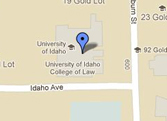College of Law
Moscow

uilaw@uidaho.edu
Administration Office: 208-885-2255
Dean’s Office: 208-885-4977
fax: 208-885-5709
Menard 101
711 S. Rayburn Drive
Mailing Address:
College of Law
University of Idaho
875 Perimeter Drive MS 2321
Moscow, ID 83844-2321
Boise
First Monday - May 3, 2010
In this issue:
- Bellwood Lecture Program Features Diverse Perspectives.
- College of Law Hosts U.S. Court of Appeals for Veterans Claims.
- Students Shine at National Evidence Moot Court Competition.
- Rosholt Roundtable Blends Securities Law, International Business, and Philanthropic Entrepreneurism.
Bellwood Lecture Program Features Diverse Perspectives
The Sherman J. Bellwood Memorial Lecture series, which began in 1997 with a presentation by University of Colorado historian and American Indian law scholar Charles Wilkinson, came full circle in 2010 with a unique program headlined by three nationally prominent Native leaders with diverse experiences in Native American law and policy. This year’s Bellwood speakers provided the perspectives of America’s top Indian affairs administrator, Larry Echo Hawk, Assistant U.S. Secretary of the Interior; esteemed civil rights lawyer Lawrence Baca, currently the national president of the Federal Bar Association; and distinguished educator Professor Rebecca Tsosie, executive director of the Indian Legal Program at the Sandra Day O’Connor College of Law at Arizona State University.
The 2010 Bellwood program began on April 15 with a reception for members of the bench and bar in Boise, where the speakers provided commentaries on current issues facing Indian Country. On April 16, in Moscow, the speakers met with the University of Idaho Native American Law Students Association and other law student organization leaders, and then addressed an open gathering of students and faculty in the Menard Building courtroom, where they shared personal and occasionally emotional insights. The session ended with a spontaneous standing ovation. The speakers later joined Idaho and Northwest tribal leaders for lunch on the University of Idaho campus, and then collaborated to deliver the Bellwood Lecture in the afternoon at the ASUI Kibbie Dome. After being honored by local Native dancers and welcomed by UI Board of Regents President Paul Agidius and UI President Duane Nellis, the three Bellwood speakers focused on the theme, “The United States and Tribal Nations: An Evolving Relationship Guided by Domestic and International Law.” After each of them had spoken individually, Assistant Secretary Echo Hawk convened a three-way dialogue on selected issues. This program, like the courtroom session earlier in the day, culminated in a standing ovation.
During his individual remarks, Assistant Secretary Echo Hawk (who had the distinction of being the nation’s highest ranking Native American in state elective office when Idaho voters made him the state’s Attorney General in 1990) recalled the difficulty of deciding whether to accept his current appointment in the Department of the Interior. Throughout much of American history the federal government has been an instrument of violence and "legal subjugation" directed toward tribal peoples. "Do you see why I would hesitate?" he asked the audience. But then, answering his own question, he added, "I could not say no…. I only want to do what is right and just in a new generation of Native law." He called for a spirit of respect, collaboration, openness, and “brotherhood” in shaping the relationship between the federal government and the tribes.
Lawrence Baca recalled the occasional turbulence of his 32-year career as a civil rights attorney in the U.S. Department of Justice. He provided anecdotes illustrating a culture of indifference, and in some instances hostility, toward cases involving Native American litigants, including plaintiffs asserting claims under the Indian Civil Rights Act of 1968 as well as general civil rights statutes. Once, when admonished for “doing too much work on behalf of Indians,” he questioned whether any black or white attorneys in the Department had been similarly warned against working too hard for persons in racial or ethnic groups to which they belonged. Nonetheless, he sounded a note of cautious optimism about current challenges, noting that there are vastly more Native lawyers, and other lawyers interested in Native issues, than there were at the outset of his career.
Professor Tsosie highlighted the growing connections between Native American issues and principles of international law. She noted, in particular, the tensions between U.S. domestic law and the 2007 United Nations Declaration on the Rights of Indigenous Peoples, which the United States has not (yet) signed. She acknowledged concerns about the Declaration’s provisions relating to Native land rights, as well as environmental and cultural rights, but she argued that the Declaration should be regarded, not as a threat, but as a point of reference for the evolution of Native American law and policy.
The 2010 Bellwood Lecture programs were organized by College of Law Professor Angelique EagleWoman (whom Professor Tsosie described as a “national treasure”), with assistance from Associate Deans Elizabeth Brandt and Helen Albertson-Ploucha. Further information is available from Professor EagleWoman (eaglewoman@uidaho.edu), and a streaming video of the April 16 Bellwood Lecture may be viewed on the Bellwood Lecture Series site.
College of Law Hosts U.S. Court of Appeals for Veterans Claims
On April 13, the College of Law, which last year hosted a panel of the U.S. Court of Appeals for the Ninth Circuit, welcomed another federal appellate court – this time, the United States Court of Appeals for Veterans Claims (CAVC), which held an oral argument in the Menard Building courtroom. The CAVC, established in 1988 by Congress under Article I of the U. S. Constitution, provides judicial review of decisions made by the Board of Veterans Appeals within the U. S. Department of Veterans Affairs (the “VA”). The Court, consisting of judges appointed by the President with confirmation by the Senate, initially was known as the Court of Veterans Appeals, but the title was changed in 1999 to the current style of Court of Appeals for Veterans Claims. The seven-member Court, which often sits in panels of three, hears appeals by veterans from adverse administrative decisions on claims of entitlement to benefits for service-connected disabilities, survivor benefits, and other benefits such as education payments and waiver of indebtedness.
In Moscow, a panel composed of Judge Alan Lance (former Attorney General of Idaho), Judge Lawrence Hagel, and Judge William Moorman, heard an appeal from denial of a claim for medical benefits by a serviceman discharged for misconduct but “under honorable conditions.” Due to a family emergency, Judge Moorman was unable to travel to Moscow; however, using technology available in the courtroom, he was able to follow the argument by audio connection. (The Menard courtroom is also equipped to provide remote video connections.) During the Court’s visit to Moscow, the judges and members of the Court’s professional staff interacted with students, conducted an orientation on veterans’ issues, and participated in a Q&A session on federal appellate practice.
The College of Law invited the Court to sit in Moscow at the suggestion of law students who had donated significant hours of pro bono service to the processing of veterans’ claims in Washington, D.C. The service is one of many pro bono activities undertaken during “alternative spring breaks” organized by UI law students during the past three years. Further information about the CAVC’s visit to Idaho may be obtained from Associate Dean Helen Albertson.
Students Shine at National Evidence Moot Court Competition
The University of Idaho Evidence Moot Court Team, composed of law students Jetta Hatch, Jake Naylor, and Sarah Simmons, performed admirably in the Jerome Prince Memorial Evidence Moot Court Competition hosted by the Brooklyn Law School on April 8-9. The students’ success in preliminary rounds enabled them to reach the “sweet sixteen” level of teams advancing to an “octo-final” round. This was the farthest any Idaho team has advanced since the College of Law began competing in the Prince Competition. According the team’s coach, College of Law Professor Alan Williams, it was “truly a pleasure” to watch the Idaho students compete in front of a very distinguished and active bench. The concluding argument in the final round was judged by U.S. Supreme Court Justice Samuel Alito, Jr., United States Court of Appeals Judge M. Margaret McKeown of the Ninth Circuit, and New York State Court of Appeals Judge Victoria A. Graffeo.
Rosholt Roundtable Blends Securities Law, International Business, and Philanthropic Entrepreneurism
[Note: This story appeared in the April edition of “First Monday,” but was typographically altered in some electronic distributions; accordingly, it is presented again here.] On February 24, the College of Law hosted the annual Rosholt Roundtable, a unique event underwritten by Twin Falls attorney John Rosholt (UI Law ‘55) and his spouse Karen. The purpose of the Roundtable is to expose law students to the life stories and professional experiences of lawyers who have achieved distinction in pursuits other than the traditional practice of law. This year’s Rosholt guest, Larry B. Grimes (UI Law ’67), brought a uniquely varied background to his presentations as a guest lecturer in a Securities Law class and as a luncheon speaker at the College of Law.
Upon graduation from the College, Mr. Grimes became a Trial Attorney in the Division of Enforcement of the Securities & Exchange Commission. He later served as Branch Chief of the SEC’s Organized Crime enforcement branch and as Assistant Chief Trial Attorney of the Commission’s Division of Enforcement. Subsequently, he went into corporate practice at Westinghouse Electric Corporation, then opened a specialized solo practice, and then merged his practice with the international firm, McGuire, Woods & Battle. He served as partner-in-charge of the firm’s Washington, D.C., office until taking an early retirement in order to reduce his active practice by about 50% and to spend the remaining time pursuing other business and charitable matters. He has acted as general counsel for a number of companies, joint ventures and other institutions including the National Coal Council, a Federal Advisory Committee appointed by the Secretary of Energy, and as a Senior Member of the Synthesis Group, an Advisory Committee on Policy of the National Aeronautics and Space Administration. Although he has maintained his office and residence in Washington, D.C., his practice in the 80”s and 90’s was managed out of offices in Bermuda and England (London and Bath). In early 2010 he became General Counsel to The Ventura Group, one of the fastest growing Hispanic-owned companies in the nation. He recently completed a term as Chairman of the Lionel Hampton International Jazz Festival’s Board of Advisors, and he has served as president of ArtsBacker, an entity that supports and invests in the performing arts, at Washington, D.C.
More information about the Rosholt Roundtable can be obtained from Anne-Marie Fulfer, Director of Career Development.


